« January 2007 | Main | March 2007 »
February 28, 2007
Into Pirate Waters
LOCATION: Arabian Sea Crossing
Day: 29
SEE WHERE WE ARE!
Longitude: N:14°53.085'
Latitude: E: 056°01.346'
Heading: 300°M
Wind: ENE, Force: 1
Miles total Mumbai - Djibouti: 1,856
Miles from Mumbai: 1,070
Miles to Djibouti: 786
We are now approaching a critical point in the voyage that was always going to be make or break in terms of actually getting to Djibouti: entering into the Gulf of Aden before getting swept south down the Somali coast towards South Africa. And on Sunday another variable entered the equation with a UN cargo vessel being hijacked by pirates just south of the horn of Africa at Raas Xaafun.
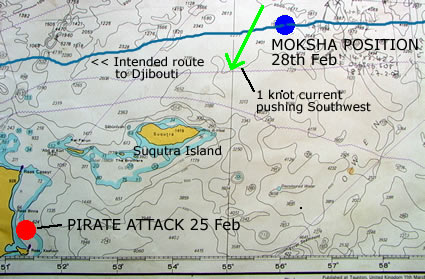
According to an Associated Press news report (which took over 20 minutes to download via the tortuously slow satphone connection!), the vessel was delivering UN food aid to the northeastern area of Somalia. The 'MV Rozen' had just dropped off more than 1,800 tons of food aid in the semiautonomous region of Puntland when the pirates struck. It was not immediately known if any of the 12 crew members aboard six from Sri Lanka and six from Kenya were injured in the attack.
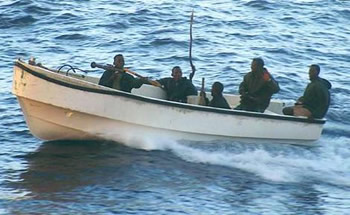
The 1,880-mile coast of Somalia, which has had no effective government since warlords ousted a dictatorship in 1991 and then turned on each other, has emerged as one of the most dangerous areas for ships. Somali pirates are trained fighters, often dressed in military fatigues, using speedboats equipped with satellite phones and Global Positioning System equipment. They are typically armed with automatic weapons, anti-tank rocket launchers and various types of grenades, according to the U.N. Monitoring Group on Somalia. The bandits target both passenger and cargo vessels for ransom or loot, using the money to buy weapons.
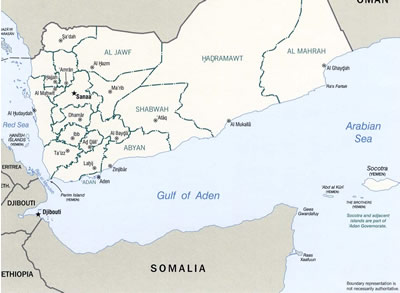
From our standpoint the attack probably doesn't change things that much. It sounds like the attack was very much targeting a vessel that the pirates knew might yield ransom money for the safe return of both crew and cargo (being UN). As Sher said, it might even be an inside job. It's unlikely that any of these characters would know what to make of this little pedal boat even if they knew where to find us. But there is the danger of them taking us hostage for ransom and just abandoning the boat. For this reason I've started to have Sher answer the VHF radio so he can speak Urdu with the local fishing boats that we've seen an abundance of these past few days, and who are all keen for a yarn on the radio to find out what the hell we're up to. With a range of over 60 miles on our radio there's danger one of these conversations might be picked up by some unsavoury types who then come looking for us, especially if they hear a Brit accent. Along these same lines I'm considering taking down our radar ball to lessen the chances of detection - assuming some of the more sophisticated pirate operations have radar themselves, which in the absence of knowing otherwise we have to assume they do. But this increases the chance of getting run over by a cargo ship out here, so these decision are never easy.
Perhaps the most alarming new development has been an aggressive one knot current pushing us southward for the past 48 hours. We're trying to counteract it with a corresponding aggressive 300 degree heading, but still we're being taken south, and the worry is that we'll miss the mouth of the Gulf of Aden, and worse still end up around the island of Suqutra which enjoys the dubious title as the world's #1 pirate hotspot! (Sort of like Freetown was for Jamaican pirates back in the 1800's). So the next 72 hours will be critical in how our fate plays out. All efforts are now being directed at pedaling as hard as we can at 300 degrees to slow the southerly drift. This is when a little mercy from Poseidon is very welcome, when we're maxed out in our ability to out-muscle mother nature. Thank goodness there are two of us on board to keep up the pressure.
jason
Posted at 2:25 PM | Comments (1)
February 25, 2007
Half Way!
LOCATION: Arabian Sea Crossing
Day: 26
SEE WHERE WE ARE!
Longitude: N:15°18.103'
Latitude: E: 058°13.467'
Heading: 240°M
Wind: ENE, Force: 1-2
Miles total Mumbai - Djibouti: 1,856
Miles from Mumbai: 941
Miles to Djibouti: 915
This afternoon we crossed the half way mark, a welcome milestone in any voyage. With 928 miles under our belts we have the same to go before making landfall on African shores in around 20 days' time.
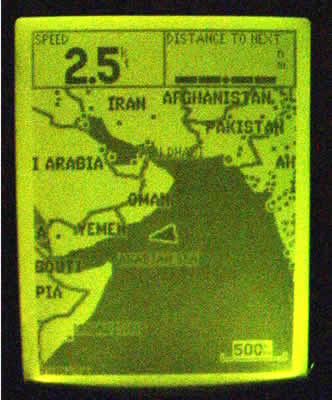
Originally we were expecting this point to come alot earlier in the voyage but the conditions have been less favourable than anticipated with the typical northeasterlies (wind) for this time of year only kicking in this past week, and then only at a lower force than predicted by historical data. So its been a real sweat-fest with each mile gained with little or no assistance from any external forces of nature. On previous voyages across the north Atlantic and Pacific oceans that have involved traveling in the trade winds belts it is usual to attribute up to 20% of one's daily mileage from the wind, current and action of the waves. But on this voyage we've had only one day when the wind was force 3 at our stern and we managed notched up the original estimate of 50 miles (of which 10 could be said to be thanks to the wind). The mileage on all other days has been ground out by muscle power alone, which at least keeps our conscience clear as to the authenticity of this voyage as a human powered one!
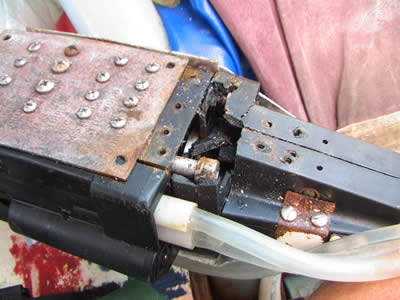
The watermaker disintegrated for the umpteenth time today. At first it looked like this was at last the end of the line for the poor thing. We've babied it along for almost two weeks now since the initial failure and we thought it might even make it to Djibouti (although the prospect of having to come good on my promise to dance the fandango in my birthday suit upon arrival was starting to worry me a little). But just as we were about the stash it away for good and commit ourselves to rationing out the remaining 160 litres for the remainder of the voyage we noticed one last piece of metal on the boat that could be used for a repair. The two brass name plaques of the major donors that contributed to the initial construction of the boat had already been used, leaving the final name plaque for the Moksha herself.
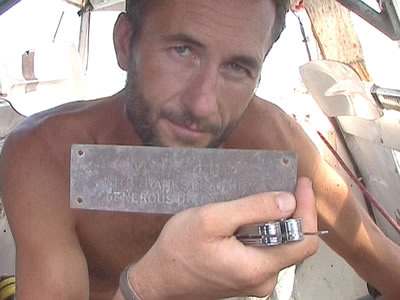
It seemed a little sacrilegious to be drilling holes in something so integral to the identity of this craft that has weathered so many thousands of miles of open ocean and survived so many near misses over the years, including almost sinking in Morro Bay, California in 1997, and being wrecked on the Great Barrier Reef off the coast of Queensland in 2000. But as Steve once said, "At the end of the day she's just a boat". While Moksha can do without her name plaque for a few weeks, us humans certainly cannot do the same without water. So even with Sher's protestations ringing in my ears that I was committing some cardinal sin there was little absolutely zero doubt in my mind that this was the right thing to do.
jason
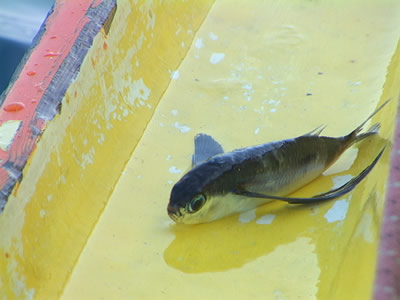
Posted at 1:57 PM | Comments (1)
February 23, 2007
Visitors
LOCATION: Arabian Sea Crossing
Day: 24
SEE WHERE WE ARE!
Longitude: N:15°12.930'
Latitude: E: 059°45.142'
Heading: 280°M
Wind: NNE, Force: 2-3
Miles total Mumbai - Djibouti: 1,856
Miles from Mumbai: 849
Miles to Djibouti: 1,007
We have a regular visitor between 8 and 8.30 every morning. It is a white Booby bird, that comes from the south, circles the boat a couple of times before flying away. I first noticed this bird around 10 days ago and have started looking out for it every morning and it has arrived unfailingly. I started thinking about this bird the other day. Is there a reason for it to visit us every morning? Maybe it realizes that we are strangers in this environment and it comes to check up on us and makes sure we're OK. Perhaps it knows that we are visiting guests here, and this is its way to make us feel welcome. These are all questions, the answers to which I will never know of course. But somehow though the sight of that bird every morning reassures me that all will be well.
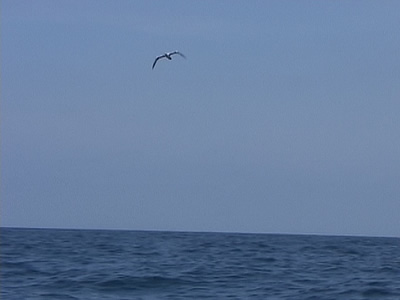
Yesterday we had some other visitors of a very different ilk. It was around 5pm and we were drinking our evening tea and biscuits. It had at last started cooling down from furnace heat of the day, a time of day much looked forward to. Suddenly I noticed a boat on the horizon with smoke billowing from the chimney. We hadn't seen ship in many days so the sight of this boat raised our pulses a little. It appeared that the ship was heading in our direction, so we temporarily changed our course. We called out on our VHF radio to avert a possible collision course but got no response. Assuming the worst we immediately starting hiding all the electronics (cameras/laptops etc) and waited in anticipation for this boat to come up along side. As it pulled nearer it looked like some kind of cargo or fishing boat with the flag belonging either to Yemen or Oman (red over white over green with a crescent moon bissected by a dagger?). There must have been about 40-50 people out on deck, peering at us with intense curiosity and I suspect trying to figure out what on earth is was that we were doing. The skipper then appeared from the wheelhouse and called over to ask if we were OK. We smiled and waved back, replying that we were indeed out here by choice, in full control of our mental faculties and en route to Djibouti. I got the sense that we might have come across as being quite unfriendly after all the trouble they had taken to check up on us. After a few moments, realizing that all was well, they motored off towards the Northeast. Looking at that boat as it left I got the distinct feeling that these were the first but certainly not the last curiosity seekers that we would encounter before the end of the voyage.
After three weeks out here the mind has slowly begun to get in tune and develop an awareness of this new environment. The sights, sounds and stimuli associated with land are already a distant memory. Changes in wind speed, direction and the size of the waves are quickly detected. In this new reality the priorities are very different to what they were on land.
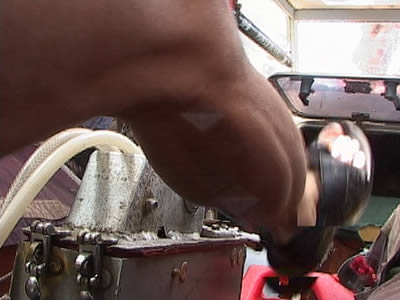
All the time we are affected by the action of the waves, the energy of each pushes us forward, backwards, sideways, laterally, up and down. We encounter each of these motions and after a while the mind unconsciously adapts to this energy, pre-empting the outcome very often, allowing us to better react to these different forces and maintain our balance without even thinking about it.
The sea around us appears as an uninterrupted continuum, yet in this seemingly limitless expanse of water there are changes happening all the time. The sea is constantly in a state of flux. It makes large scale experiments on us. Each day brings new experiments. Our ability to survive depends upon adapting to these constant changes. At the moment we are travelers moving along the surface. This could all change at a moments notice. Nothing is taken for granted out here.
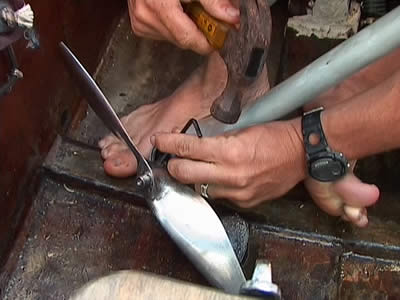
On a more practical note we had our first pedal unit failure the day before yesterday. Traditionally it is the prop shaft that fails, but this problem seems to have fixed by the wonderful work of Mark et al from Harken marine. This time it was the vertical drive shaft running the length of the unit that broke at the weakest point where a pin secures the lower sprocket.
sher
Posted at 1:49 PM
February 20, 2007
The Circumnavigation Debate - Your Opinion Needed!
LOCATION: Arabian Sea Crossing
Day: 21
SEE WHERE WE ARE!
Longitude: N:15°23.286'
Latitude: E: 061°27.814'
Heading: 270°M
Wind: E, Force: 1
Miles from Mumbai: 747
Miles to Djibouti: 1,053
Some of you may already be aware of the dispute that is currently brewing between no less than three expeditions attempting or claiming human powered circumnavigations. In May of last year Canadian Colin Angus completed a circle of the northern hemisphere with Expedition Canada but is claiming a full circumnavigation. Erden Eruç of Around n Over, Tim Harvey (Angus's former travel mate) of Vancouver to Vancouver and myself with Expedition 360 are challenging the claim on the grounds that it doesn't meet the minimum requirements as laid down by Guinness Book for their human powered circumnavigation category, which include the need for the traveler to cross the equator at least once and in addition for a 'true' circumnavigation to be achieved, reach a pair of antipodes en route (points on the surface of the planet that are opposite to each other). Angus is referencing guidelines delineated for aircraft, including hot air balloons, by the Fédération Aéronautique Internationale (FAI) that allow for travel in just one hemisphere.
A forum for public debate on this contentious issue has been opened by National Geographic in the March issue of Adventure and your input in the form of a letter to the editor is urgently requested! To download the relevant piece click here (2Mb PDF).
Letters to the editor can be sent through to this email address -
email: adventure@ngs.org
Or snail mail -
Letters to the Editor
Adventure
104 West 40th St
New York, NY 10018
USA
Include name, mailing address and phone number.
The only thing I would personally request is that you enter into this debate with an open mind, putting aside any pre-existing loyalties in the interests of a fair hearing for all parties concerned. This dispute is one that can only be resolved within the public domain by readers like you, so please if you have the time, digest the various arguments and consider offering an opinion.
You might also find the following links of some use as additional reference -
Expedition 360 information and stance on antipodal points: http://www.expedition360.com/home/circumnavigation.htm
Around n' Over expedition background and stance on antipodal points: http://www.around-n-over.org/circumnavigation.htm
Wikipedia on circumnavigation: http://en.wikipedia.org/wiki/Circumnavigation
Wikipedia on antipodes: http://en.wikipedia.org/wiki/Antipodes
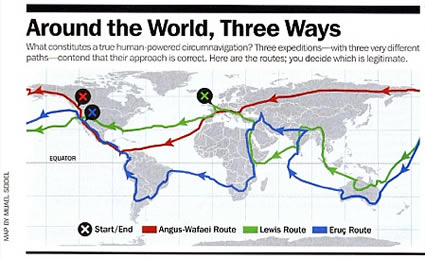
This map, which appears in the National Geographic piece, is a little misleading as it suggests that all three expeditions are in dispute with each other. This is not so. The routes for Lewis and Eruç are in mutual agreement using the antipodal requirement as their benchmarks. They are in dispute with the Angus route, which traveled only in the northern hemisphere.
jason
Posted at 3:02 PM | Comments (1)
February 18, 2007
The Things we Value the Most
LOCATION: Arabian Sea Crossing
Day: 19
SEE WHERE WE ARE!
Longitude: N:15°23.606'
Latitude: E: 062°56.342'
Heading: 270°M
Wind: ENE, Force: 1
Miles from Mumbai: 660
Miles to Djibouti: 1,140
After nearly three weeks at sea the material things we value have altered to ones completely centred around life on board the boat. Land based things like money have absolutely no value out here at all of course.
Aside from each other, here are some of the things we value the most....
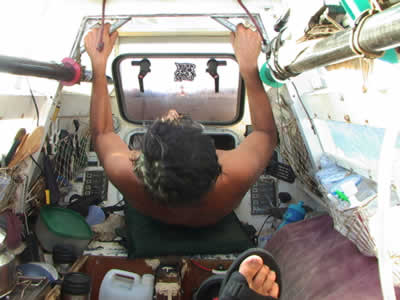
SLEEPING COMPARTMENT
This comes in pretty high on the ratings scale. affectionately known as the 'rathole', this tiny space looks about as inviting as a lead-lined coffin, but it is without question the most highly prized area of real estate on the entire boat. After each 3-hour graveyard shift it is the most heavenly thing to be able to slide full length inside and relax our aching muscles. And the gentle rocking of the boat puts us asleep like babies in no time.
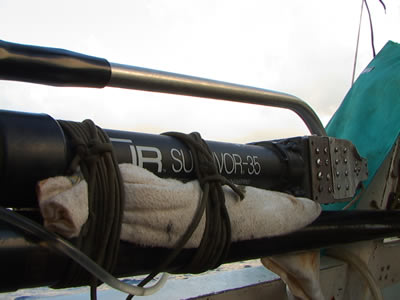
WATER MAKER
Essential to our survival this handpump watermaker is still hanging in there thanks to a series of major surgeries to fix a major crack early on in the voyage. Each day both Sher and I pump this thing for around 40 mins to produce a total of 5 litres of fresh water from sea water (the process involves reverse osmosis) - enough for one person's intake per day. We draw the other 5 litres from the containers of water given to us earlier in the voyage by the MSC Eliana.
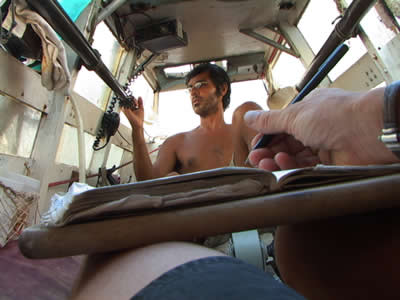
CUTTING BOARD
Our cutting board performs a multitude of functions from the obvious one of preparing food, to a writing platform, to a lid for the saucepans, to a hefty piece of timber to hammer things with.
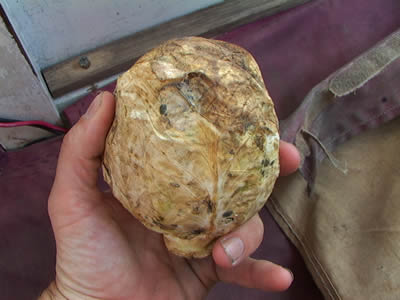
THE LAST CABBAGE!
This is our last cabbage, and as you can tell it's seen better days...
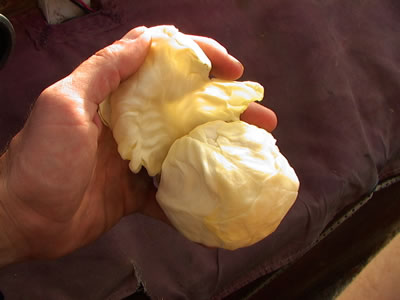
But take off the outer layer and the underneath stays fresh for weeks. Each afternoon we each peel off a leaf to munch - delicious!

CUP of TEA
And there's nothing like a cup of the old Rosie Lee to look forward to during the long graveyard shifts at night.
jason
Posted at 3:11 PM
February 16, 2007
The Arabian Doldrums
LOCATION: Arabian Sea Crossing
Day: 17
SEE WHERE WE ARE!
Longitude: N:15°35.652'
Latitude: E: 064°18.077'
Heading: 255°M
Wind: variable, force: calm
Miles from Mumbai: 580
Miles to Djibouti: 1,220
This is the sixth day without a breath of wind, reminding me of crossing the doldrums during the voyage from Hawaii to Tarawa, in all but one respect; progress. While a one knot counter current kept the boat in the same position for almost three weeks back then, at least these past few days have seen miles made west, a daily average of 40 to be more precise, which is good for morale. Hope is a very hard commodity to hold onto when there is no net movement in the right direction.
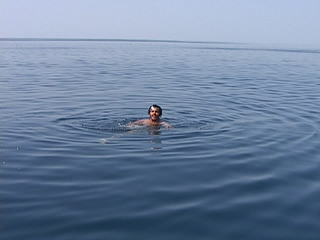
So on we plod, or rather grind, slowly inching our way across this glassy plain. During the night time hours the temperature is quite comfortable and the sensation of pedaling without any of the usual external sense stimuli, such as moonlight, sound of any kind or the rolling motion of the boat is quite surreal, rather like what I would imagine it would be drifting across a zero gravity void like outer space. In the heat of the day the unrelenting sun throws up a loose curtain of haze that hangs over the horizon like a torpid fog, obscuring any definition between sea and sky and adding further to the sensation of spatial bewilderment. It is through this desert that we find solace in a few more miles chalked up on the GPS, a cup of tea around 5pm, swimming between pedal shifts and moronic conversations about famous palindromes than dwindle into little more than jibber jabber.
Able was ere saw elba.
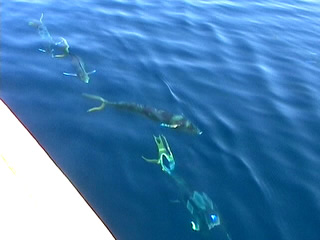
One break to the pattern however was the arrival of a squadron of dorado fish yesterday, around 12 in total, that have since been using the underside of the boat as sort of basecamp from which to launch their hunting forays into the outlying waters in search of flying fish. They really are beautiful animals - all colours of the rainbow including luminous turquoises and emerald greens shimmering just below the surface and close enough to the side of the boat that one could almost reach out and pet them. And just when the monotony of life on board is starting to addle our brains we've been treated to breathtaking displays of acrobatics as the dorado take to the air in yet another desperate chase between hunter and hunted.
jason
Posted at 2:29 PM | Comments (1)
February 14, 2007
First Impression of Life on the Ocean Wave - from Sher
LOCATION: Arabian Sea Crossing
Day: 15
SEE WHERE WE ARE!
Longitude: N:16°03138
Latitude: E: 065°54243
Heading: 210°M
Wind: variable, force: calm
Miles from Mumbai: 500
Miles to Djibouti: 1,300
It's all about the wind. Or in our case, the lack thereof.
The last three days of the voyage have been the toughest so far. The lack of any assistance from the wind has made progress very challenging. Each mile has to be earned in sweat and aching knees. The sun has been unrelenting as it follows its daily path from one end of the horizon to the other. It has been VERY hot, and the ocean has been at times completely still and eerily silent.
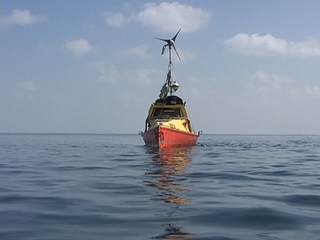
I first pedaling Moksha almost 11 years ago in Santa Cruz, California, on a clear Autumn day. As Jason and I left the harbour we became fouled in sea kelp and the rest of the time we spent untangling the propellor and then pedaling back to harbour.
The idea of a human powered crossing of an ocean had captured my imagination at that time. It never occurred to me that I might one day be pedaling Moksha on one of the ocean legs. About three months ago I was asked by Jason if I might be interested in accompanying him on the Arabian Sea crossing to Africa. I had to think long and hard, but eventually the lure of that same idea that had captured my imagination all those years ago proved too hard to resist.
Moksha cuts through the water effortlessly. She yields to the movement of the waves rather than fight against them. It is possible to get a feel for each wave as it passes underneath.
Adjusting to life on board has been easier than I imagined, helped in part by the lack of knowledge and any pre-conceived notions. The ocean is an alien environment not conducive to human survival. Our ability to stay alive out here more than a few hours is dependent upon the resources and equipment somehow loaded into this tiny 4 foot by 26 foot universe. And the fact that all that separates us from half a mile of ocean is just half an inch of wood reiterates just how fragile our condition is.
Life on board brings with it its own set of challenges. There is the constant movement of the ocean (when there's wind!), lack of space and after a while the constant tiredeness that comes from only being able to sleep for 2-3 hours at any one stretch, and a total of 6 hours in any 24 hour period. Every movement has to be carefully choreographed, each action rehearsed in the mind. And the steps required to execute each action have to be completed in a methodical and sequential manner to avoid a disastrous outcome, such as dinner ending up in the bottom of the boat.
The biggest challenge I've found is trying to stay awake while pedaling at night. I've developed my own techniques to keep from dozing off; some nights are spent listening to music on our little ipod shuffle while others are spent enjoying the beauty of the moon reflecting on the surface of the ocean all around. The last few nights has seen incredible phosphorescence in the water. The still darkness of the water has been periodically interrupted by explosive patterns of liquid silver fireworks triggered by shoals of flying fish breaking the surface.
Sitting on the back deck, sipping my evening cup of tea and watching the sun go down, is definitely one of the high points of the day. This little bit of free time from pedaling or doing chores allows a short period for reflection and what an enormous contrast this way of life this is compared my normal life - sitting behind a desk at Hewlett Packard in Cupertino.
Now if only the wind would pick up...
Sher
Posted at 2:32 PM
February 12, 2007
A New Routing
LOCATION: Arabian Sea Crossing
Day: 13
SEE WHERE WE ARE!
Longitude: N:16°96435
Latitude: E: 066°37268
Heading: 210°M
Wind: westerly, force 1
Miles from Mumbai: 423
Miles to Djibouti: 1,337
Now that we have fresh water aboard and even managing to coax a good gallon a day out of one of the handpump operated watermakers (the 35 Survivor, held together with strips cut from the cooking pot lid), our priorities have shifted to the next problem in line which is actually making forward progress. Whether we are experiencing a seasonal anomaly to be expected for this time of year, or some larger scale disruption attributable to global weather change, the bottom line is that for the past 7-8 days we have been pedaling against a very stubborn westerly breeze that has slowed our westwards progress to a crawl. Even with toiling around the clock in tight 2.5 hour shifts in the daylight hours and 3 hour shifts at night we are only able to clear between 20-25 nauticals every 24 hours. The planned mileage for the voyage was an average of more around 45 miles per day with two pairs of leg on board.
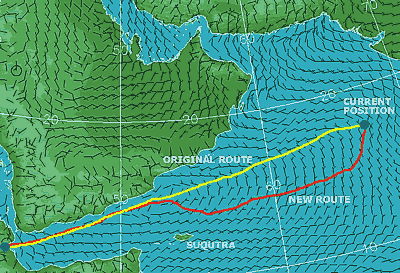
The problem appears to lie with a region of weak high pressure lying in an east-west position immediately to the west of our current position and south of the Arabian peninsular. What we've essentially been trying to do this past week is punch through the eastern edge of the high and through the middle of it, but with only 0.3 of a horsepower at our disposal for the engine this is proving brutally hard on the knees and with little reward to show for it. For this reason we have a new plan of action which will hopefully still keep us north of the island of Suqutra and remainder of the horn area which is well known for piracy. We'll drop down to around 15 degrees north from our current latitude of 18 degrees and try and use the more predominant northeasterly and easterly winds in that region to slip underneath the high with better mileage than we've been getting. Then before reaching the renowned island of Suqutra we'll head northwest again to rendezvous with our original route just south of the Yemen coast, and try and maintain the minimum recommended clearance of 150 miles from the Somali coast to avoid any unwanted visitors.
We are beginning to develop our anti-pirate stragegy. Nudity and huge beards will be a must of course, to fool them into thinking we're barking mad (shouldn't be too difficult by that point in the voyage). Plus daubing our faces with the remains of the marmite might make them think twice about coming aboard. My only worry however is that they might feel like they're putting us out of our misery by shooting us anyway.
jason
Posted at 12:55 PM
February 10, 2007
Resupply!
LOCATION: Arabian Sea Crossing
Day: 11
SEE WHERE WE ARE!
Longitude: N:17°86229
Latitude: E: 066°81580
Heading: 240°M
Wind: west, force 2
Miles from Mumbai: 360
Miles to Djibouti: 1,440
Our water woes have been solved in the shape of container ship MSC Eliana rendezvousing with us around 10.30 pm last night and supplying us with 175 litres of fresh drinking water.
Jason's father had taken the initiative to contact Falmouth Coastguard in the UK, asking them to inform any ships in our vicinity that might be in a position to do the needful. Falmouth CC in turn contacted MRCC (Mumbai Regional Coast Guard) with the request and our latest position. They then relayed the message to ships in this section of the Arabian Sea.
Around the same time Mr Rajan, sailing coordinator for the Royal Bombay Yacht Club, read the previous blog entry to this one and made a call to the MRCC also.
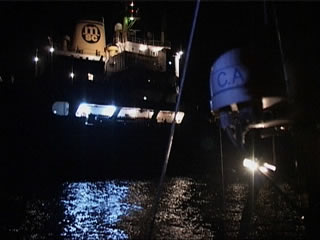
While this procedure was unfolding, completely unknown to us, we had patched up our manual watermaker by cutting additional strips from our cooking pot lid and reinforced the plastic section holding the handle that had cracked. We then tied the watermaker to the side of the boat and were able to pump a gallon of drinking water without any further cracks appearing in the unit. We were understandably quite excited with this development and with the thought that this patched up watermaker might be serviceable for the remainder of the voyage.
After our cup of tea in the evening Jason picked up a message from his father on the Iridium phone indicating that he had notified Falmouth CC of our water problems. He then switched the VHF radio on and almost immediately heard a message from motor tanker Emerald Sky that was attempting to make contact with us. We were taken unawares but gathered our wits and duly made return contact - around 7pm yesterday evening. The tanker indicated that it was 48 miles from our position and traveling towards our position at a speed of 12 knots.
In the meantime the MRCC had also made contact with another commercial vessel, the MSC Eliana, who turned out to be only 20 miles from our position traveling between Dubai and Colombo in Sri Lanka. At this point both ships were heading our way. We then indicated to the Captain of the Emerald Sky that since we had an alternative solution nearer to hand that we could cut him loose to resume his original heading.
We spoke with the Captain of MSC Eliana through the VHF radio and it was mutually agreed upon that the logistics of the rendezvous would happen once we could both make visual contact with each other. We then had dinner and waited for the ship to appear on our Southwest horizon. Around 9pm we could make out the floodlit deck and running lights.
On instructions from the ship's Captain we were instructed to approach and tie up to their leeward side (sheltered from the wind and waves). At around 9.30 we pedaling alongside and threw up our bow line to the crew waiting on deck. After securing Moksha we then began the process of transferring the water on board. They had set aside 180 litres of water in 8 x cylindrical containers each with the capacity of 22.7 litres. Each container was then lowered and stashed temporarily in the cockpit. Looking at the size of one of these things it became obvious that storing them in an otherwise already over-laden boat was going to be difficult. We secured four of them on the roof of the hatch.
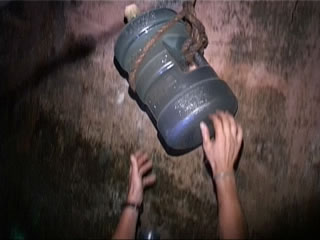
We had earlier asked the Captain how we might reciprocate his kind gesture and he had indicated that if we had any novels that we had finished reading that we could send these aloft. Jason decided that he would insert a $50 inside one of the books as a token of our appreciation - to be shared amongst the crew. There was an immediate response however that this was 'unacceptable'. "God has already given us enough!" was the cry that came down to us.
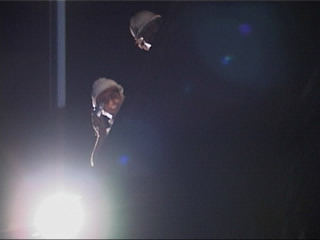
We then disengaged the lines, thanked the crew and Captain and pedaled away into the darkness, secure in the knowledge that our water woes were a thing of the past. Two of the containers on the roof of the hatch suddenly managed to roll off and into the ocean. But we still had a boat loaded to the gills with fresh water so we weren't too concerned about trying to salvage them. We would have a hard time finding space on board for the remaining six as it was.
The next task was infinitely more difficult than anything up to this point - finding space on board to store all these containers. This would involve a major reconfiguration of the stern compartment - a space that either of us enter reluctantly at the best of times. Jason performed some yoga manoeuvres to squeeze inside the compartment and make space for the containers. An hour later the job was complete.
It was past midnight when we were finally done and able to sit down and celebrate with a couple of cold beers that the crew had kindly sent down as a gift. Unlike the $50 we found this offering to be thoroughly acceptable.
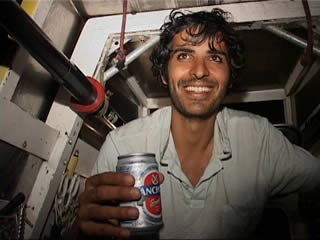
This whole operation felt like the entire cavalry was called out on our behalf - a little embarrassing but I think we have had a run of bad luck that couldn't have been foreseen. Huge thanks goes out to Jason's father, Mr Rajan of the RYBC in Mumbai, Falmouth and Mumbai Coast Guard Stations, the Emerald Sky motor-tanker and the Captain and crew of the MSC Eliana.
Sher
Posted at 3:07 PM | Comments (1)
February 8, 2007
Continuing water problems
LOCATION: Arabian Sea Crossing
Day: 9
SEE WHERE WE ARE!
Longitude: N:18°11241
Latitude: E: 067°32201
Heading: 260°M
Wind: north, force 1
Miles from Mumbai: 320
Miles to Djibouti: 1,480
Our water problems continue with the third and last watermaker proving to be quite ineffective at creating a stready supply of water. It's a brand new unit, so there is no excuse. The rate of flow at present is about two drops per second; enough to keep the two of us alive if it came down to it, but not enough to keep us both fuller operational in keeping the boat moving forward.
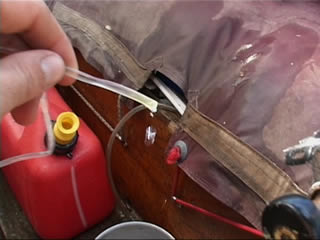
We've reinforced the first backup watermaker (see photo below) with additional metal strips (cut from one of the dinner plates). This has extended its life for the last 36 hours, but more stress cracks are starting to appear and I doubt it will last much longer. Again, shoddy materials and shoddy workmanship putting these things together at the factory. How can three units, two of them brand new, fail within the first week? Incredible.
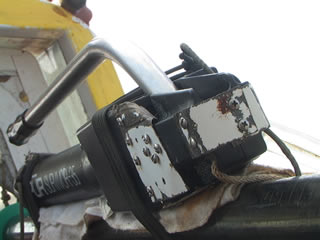
So we still have 20 gallons of emergency water in bags which gives us around 10-15 days of grace before we're completely out. During that time we'll be looking out for ships to resupply from, although in the past few days we've seen very few. I'll also be stripping down the electric watermaker (that failed first) and changing all the seals. It may be that this will get the thing going again (right now it's not building pressure), and which case all our problems are solved.
The Yemen coast is still around 20 days away at our current progress - quite slow on account of the wind and waves coming predominantly from the Northwest (on our starboard bow quarter). So if we can baby watermaker #2 along for a few more days and use the emergency supply sparingly, and ideally get resupplied by a passing ship, we'll be in great shape. At this point we have lots of options.
Bottom line for family reading this, we'll be fine. Quite a lot can happen within two weeks. Please don't panic! This stuff happens all the time (please read log from Hawaii and Tarawa voyages).
For anyone reading this in Mumbai who might have connection with shipping - if you know of any ships heading out from Mumbai en route to the Gulf of Aden who might be able to bring us out 200 litres of water please contact my father
Many thanks all. Hopefully we'll have better things to report in next update.
jason
Posted at 2:44 PM
February 6, 2007
Watermaker Failure #2!
LOCATION: Arabian Sea Crossing
Day: 6
SEE WHERE WE ARE!
Longitude: N:18°45344
Latitude: E: 068°29456
Miles from Mumbai: 270
Miles to Djibouti: 1,530
Disaster struck late yesterday afternoon in the form of the handle on the primary backup watermaker shearing off. So we're now down to just 20 gallons of emergency drinking water (enough to last us 15 days if we're very careful) and the emergency watermaker normally reserved for the liferafts. This small unit, although much slower at producing freshwater than the other two units, is still worth something - it kept Steve and I alive for 45 odd days pedaling between San Francisco and Hawaii back in 1999 after the primary watermaker failed (as this one now has - again!). Plus we can call on passing ships if we get really low, and in around 20-days we can stop in at one of the ports along the Yemen coast and resupply if need be.
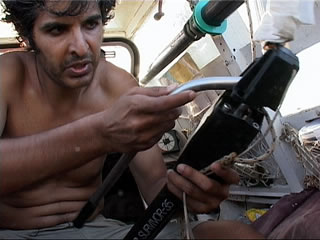
One this occasion the blame rests squarely with my own supreme stupidity. I need to digress a little to explain what happened...
Being Indian, Sher asks a lot of questions. And being Sher, he asks a whole host of other questions that most people wouldn't even dream of asking. That's why we nicknamed him 'Special Branch' back when we first met him in 1999 in California. Like the London police special investigation division he's never satisfiied until he's reached the bottom of a case.
Anyway, yesterday afternoon Sher was interrogating me on something utterly banal like why the sky is blue while pumping on the watermaker. And being already late in what turned out to be an especially hot day, with zero ventilation to the pedal seat area, my brain was fried and I had had enough of his incessant curiosity. But he had one more for me.
"So is the plastic end of this watermaker - is it important?"
The sudden change of tact in his questioning and seeming unrelatedness to anything that we'd been discussing previously was the last straw. Without even looking up from my book I uttered a dissinterested grunt and something to that effect that no, it was just cosmetic.
Five seconds and a couple more pumps on the handle later and there was a sickening crack, and Sher turned to face me with the handle very much dislocated from the main unit. It appeared that the ropes locking the unit to the side of the boat had been secured too tightly and the plastic mould holding the pump handle had split in two. Oh dear. Oh dear oh dear oh dear!!!!
If a hole had opened up in the middle of the boat right there and then I would have gladly jumped into it. I felt like such an idiot.
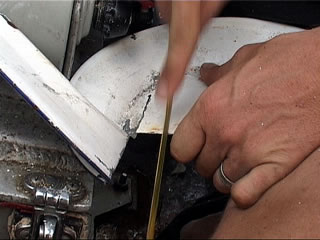
The first thing to do of course was to come up with a plan. Poor Sher has had his fair share of mishaps on this voyage already and the last thing he needed was to completely lose all confidence in the skipper. So at the time of writing we're sawing up one of the dinner plates to make some supporting strips to bind the watermaker back together again. There have been some pretty bodgy jobs done on this boat over the years but this one will probably top the list. And if it works I'll dance the Fandango in my birthday suit.
jason
Posted at 1:19 PM | Comments (1)
February 4, 2007
Watermaker Failure
LOCATION: Arabian Sea Crossing
Day: 5
SEE WHERE WE ARE!
Longitude: N:18°47374
Latitude: E: 069°42023
Miles from Mumbai: 190
Miles to Djibouti: 1,610
Sher has promised to write the next update, just in case any of you were wondering why I'm hogging all the line space.
We're gradually clawing away from the coast and into the meat of the Arabian Sea, although progress is quite slow with the wind coming exclusively from the north, prompting us to take an aggressive heading of around 300 degrees in order to avoid getting swept south. This effectively means we're pedaling against the wind and waves for much of the time which is proving hard on the knees. However I'm keen to keep as many northerly miles in hand as insurance against being put onto the Somali coast in the second half of the voyage. So a little extra sweat and pain at this early stage will I hope pay off later on down the road.
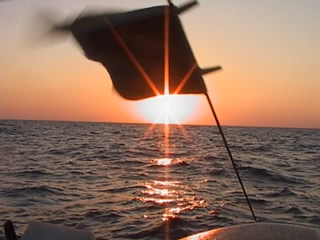
Both fans have already burnt out, so conditions on board are extremely hot and sweaty (the pedal seat area is already beginning to smell like a farmyard). The sleeping compartment is particularly ill-ventilated, and we're only able to sleep when we're too exhausted to stay awake (which is pretty much all the time). Another casualty today was the Katadyn electric watermaker that stopped producing fresh drinking water. After spending nearly $1,000 USD on new parts for this machine and countless hours getting it to work before leaving Mumbai I am furious that it has failed us so early into the voyage. Then again I am really not surprised as these wretched things have consistently failed on almost every ocean leg of the expedition so far. So we've reverted to using one of the hand operated backups which just produced a good gallon of decent drinking water for around 45 minutes of pumping. Fingers crossed it continues to behave itself for the remainder of the crossing.
jason
Posted at 4:22 PM
February 2, 2007
Bound for Africa
LOCATION: Arabian Sea
SEE WHERE WE ARE!
Longitude: N:18°42149.
Latitude: E: 070°57638.
Miles from Mumbai: 110
Miles to Djibouti: 1,690
With the Indian subcontinent now safely tucked beneath the eastern horizon and most of the coastal hazards behind us I can with confidence close the Asian chapter of the circumnavigation. Since departing Australian shores in May 2005 the route has taken the expedition through some of the richest and most diverse environments the planet has to offer: from the coral reefs of Indonesia to the rainforests of Laos to the desolate harshness of Tibet. Each regional ecosystem uniquely individual in its own way and very much representative of the different peoples that live there. It has truly been one of the most educational and enriching sections of the entire trip.
Moksha's bow is now turned towards the next continent en route - Africa. At the time of writing there are many unknowns about this area of the world that many people have raised serious questions about the safety of. Yes there are dangers and perhaps Africa has its own level of cruelty and appetite for violence that surpasses what other regions of the world are capable of. But there's also an irresistible feeling of adventure and historical significance that wells up inside of me when I read words like Khartoum and Addis Abbaba off the map. And arriving in off the waters of the Arabian Sea will I think provide quite a classic way of introduction to this most ancient of all landmasses.
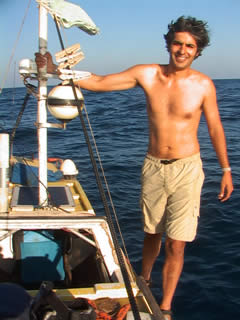
Life aboard during these early days is the usual chaos of adapting from one very different living environment to another. Sher has the worst of it, being both unfamiliar with the set up and way too large (6'2" and wide set in the shoulders). He still has yet to get used to the idea of hanging on with one hand while performing even the smallest of tasks, such as stirring the tea or opening the lid of the sugar container. So there have been frequent collisions between his head and the side of the boat. While at first these episodes were quickly followed by a fiery tirade of expletives against the particular wave in question, his outbursts have become fewer and less intense with time, to the point that now he just smiles when it happens. This is encouraging for me also, as I know that as well as being a strong pedaler, I have also asked the right person to join me in terms of his mental fortitude and ability to disassociate from pain and discomfort - an essential quality if he is to even remotely enjoy the voyage. And so far he has shown nothing but the most positive of attitudes towards the experience of being out here, which for newcomers is not always easy to adjust to.
Our worst enemy at present is fatigue, and the long graveyard shifts at night are as tortuous as I remember them to be on any of the previous voyages. We're doing our best to spend as much time snatching short catnaps in the sleeping compartment as our spare time will allow. Even lying flat for 5 minutes allows some respite from the constant rolling motion of the boat and relief for our tired muscles that are working round the clock to keeping the good ship moving forward, albeit at the laborious pace that human power affords.
Jason
PS. If the grammar on these updates comes out all squiffy it might be something to do with the keyboard on this machine being Flemish. Please excuse!
Posted at 2:39 PM | Comments (1)